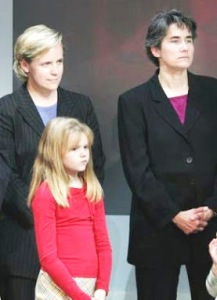
The American Supreme court yesterday voted to overturn the Defense of Marriage Act (DOMA) paving the way for the redefinition of marriage. Gay activist and lobby groups around the world are celebrating, but it is worth having a look at why many do not want marriage redefined.
Marriage is a unique institution that transcends any other relationship. The lifelong sexual exclusivity, mutual interdependence, and potential to create a family make it the most stabilizing force in our society. For the past few thousand years marriage has been defined, almost universally, as the union of one man and one woman. This system is best for our nation and should be preserved. Redefining marriage will destabilize our society and cause undue social and economic burdens that we cannot afford.
Marriage was not created to exclude homosexuals. It simply serves a purpose that homosexual relationships cannot: procreation and the stable rearing of children. The purpose of marriage (especially from the government’s perspective) is to provide a foundation upon which children can be produced and reared in the most optimal environment. As Chief Justice John Roberts stated in the oral arguments of Hollingsworth v. Perry last Tuesday, “When the institution of marriage developed historically, people didn’t get around and say lets have this institution, but let’s keep out homosexuals. The institution developed to serve purposes [the rearing of children] that, by their nature, didn’t include homosexual couples.”
Redefining marriage to include gay couples undermines its central objective by shifting the focus of marriage away from the rearing of children, towards the emotional and economic desires of the adult participants. Furthermore, as the Witherspoon Institute puts it, gay marriage “would undercut the idea that procreation is intrinsically connected to marriage.” It would fundamentally change our nation’s social and familial structure, make marriage irrelevant, and even attack our freedom of conscience.
Because gay marriage is a relatively recent phenomenon, there are very few examples of its effects. However, we can look to Scandinavia where gay marriage has become legal and socially accepted.
In the 1990s, many Scandinavian countries granted marital rights to same-sex couples. As Stanley Kurtz, Senior Fellow at the Ethics and Public Policy Center, has documented, the family structure has been all but eliminated, and marriage is becoming a novelty. In fact, it is becoming harder to measure the deterioration of the family there by the usual methods (divorce rates) because Scandinavians are hardly getting married in the first place. Simultaneously, the out-of-wedlock birthrate has exploded. As Kurtz writes, in only ten years, “Between 1990 and 2000, Norway’s out-of-wedlock birthrate rose from 39 to 50 percent, while Sweden’s rose from 47 to 55 percent.” Currently, “About 60 percent of first-born children in Denmark now have unmarried parents.” Single parenthood is now the norm, rather than the exception in Scandinavia.
As Frank Turek, author of Correct, Not Politically Correct, points out, here correlation does prove causation because we have seen the same patterns of family disintegration resulting from liberal marriage laws in other parts of the world as well. For example, in 1969, the year the first no-fault divorce law was enacted in the U.S. (in California), the out-of-wedlock birthrate was roughly 10%. Now that all fifty sates and DC enforce these laws, it is about 40%. As we can see, no-fault divorce laws have undermined marriage in the U.S. for the same reasons gay marriage has in Scandinavia: they focus marriage on the desires of the married people, not on children. Further liberalizing marriage in the U.S. will exacerbate our already high out-of-wedlock birth rate.
This is disastrous for both children and society. Study after study has shown that, statistically, children reared by their nuclear parents do better in almost every aspect of life when compared to children raised by a single parent. A study by Sara McLanahan, published in her book Growing up with a Single Parent, found that children born outside of wedlock are almost three times more likely to drop out of high school compared to their peers who come from traditional families. Another study in Sweden, published in The Lancet in 2003 found that children in two parent homes were about half as likely to suffer from suicide attempts, alcohol and drug abuse, and serious psychiatric illnesses than children raised by a single parent. Children born into single parent homes also do not have as many opportunities as traditionally raised children because they only have one stream of income, as opposed to two. The social harms of the familial breakdown are too much for the United States to bear.
Furthermore, as many homosexuals understand, it is nonsensical to argue that a child raised in the home of a same sex couple will get the same upbringing as a child raised in the home of his nuclear parents. Women and men contribute in different and unique ways to a child’s development. Ask yourself the question an eleven-year-old girl asked a dumbstruck Minnesota legislature last week: “Which parent do I not need- my mom or my dad?”
Though many gay rights activists like to argue that there is “scientific evidence” that proves children of gay couples are just as well off as children in heterosexual families, the truth is that gay marriage has not been around long enough for us to fully and definitively understand its effects upon children. As Justice Kennedy stated in the oral arguments last Tuesday, “There’s substance to the point that sociological information is new. We have five years of information [in California] to weigh against two thousand years of history or more.” If America is really looking out for its children, we should at least be prudent when redefining such a tried and true institution.
Gay marriage also affects children by contributing to the perception that fathers are not necessary to a child’s upbringing. If children don’t need both a mother and a father, as many gay rights activists propose, what reason is there for a father to stay around? Same sex marriage would encourage single mother households within the majority heterosexual community and further the breakdown of the nuclear family.
The economic burden this causes is enormous and will sow the seeds for a massive welfare state (many Scandinavian countries have some of the highest taxes and public welfare expenditures in the world). Currently, family disintegration costs American taxpayers roughly $112 billion per year, and the out-of-wedlock birthrate in America is only 40%, a number two-thirds that of Denmark. The economic toll caused by the breakdown of the family has been enormous in Scandinavia, and we should not force ourselves to subsidize homosexual marriage.
One of the more disturbing aspects of the gay rights movement is the toll it takes on our freedom of conscience. It seeks to force Americans to accept homosexual relationships as equal to heterosexual ones, despite possible moral or religious objections.
Oftentimes, the gay rights movement argues that homosexuals are discriminated against because they do not receive the same legal and economic benefits of marriage that heterosexual couples receive. However, the facts don’t always add up. According to the National Conference of State Legislatures, many states including Delaware, Hawaii, Illinois, New Jersey, and Rhode Island, recognize Civil Unions, which give homosexual couples all the rights and privileges of marriage. (Vermont, New Hampshire and Connecticut had civil unions before they redefined marriage). California, Oregon, Washington, Maine, Hawaii, the District of Columbia, Nevada, and Wisconsin allow homosexuals to claim domestic partnerships, which give almost all of the legal benefits of marriage.
Yet the gay rights crowd in these states is not content. In fact, California is in the center of the current Supreme Court hearings. The gay agenda is not to ultimately achieve economic or legal equality; it seeks to legally enforce unanimous social approval of homosexual lifestyles, to obtain mandatory social approbation from the rest of society.
These dangers are real. Many Catholic adoption centers, including the Catholic Charities of Boston, San Francisco, Washington D.C. and many affiliates in Illinois, have been forced to close because they stood by their religious beliefs and refused to allow homosexual couples to adopt children, even after they were told by their local or state governments to do so. Bishop Thomas J. Paprocki of the Diocese of Springfield, Illinois summed it up well: “In the name of tolerance, we’re not being tolerated.”
It is frightening to think about the potential fate of our freedom of conscience if the United States government forces the American public to redefine marriage. It is only a matter of time, as many Catholic priests have predicted, until a simple moral disapproval of homosexuality will be considered a hate-crime.
Redefining marriage takes away its meaning and purpose and creates a litany of other relationships that could potentially be defined as marriage. One of the most liberal justices on the Supreme Court, Justice Sonya Sotomayor, recognized this in oral arguments last Tuesday: “If you say that marriage is a fundamental right, what state restrictions could ever exist? Meaning, what state restrictions with respect to the number of people [that could get married], with respect to… the incest laws [are there]?” Sotomayor (again, one of the most liberal justices on the bench) is exactly right: redefining marriage as a civil right, instead of an institution that serves a social purpose, opens it up to a limitless number of definitions including, but not limited to, polygamy, incest, and bestiality. As openly gay co-founder of Tea Party Patriots, Doug Mainwaring, has said, we are not redefining marriage: we are “undefining” it, and the consequences are limitless.
Modern liberals too often get so caught up in bragging that they are going against the current of tradition that they too often forget why certain values and institutions became tradition in the first place. They tend to believe that new is by necessity an improvement. In the case of marriage, new is ruinous. Homosexual marriage is destructive, causes social instability, and imposes undue economic burdens on American society. America should oppose “undefining” an ancient, tried and true, and sacred institution. Marriage is the union between a man and a woman.
— Brandon G. Gill




